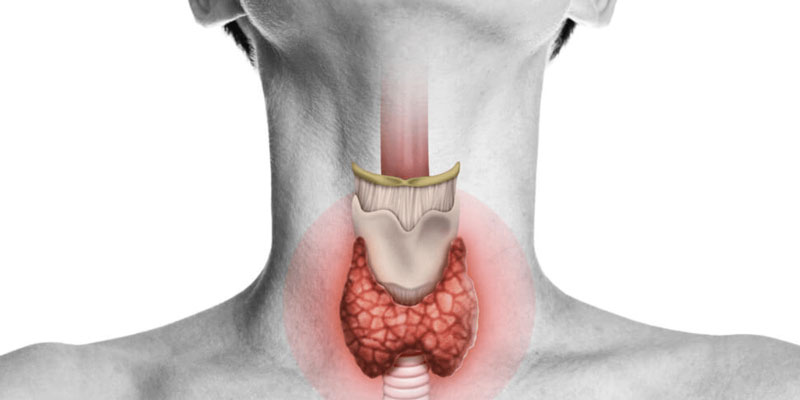Thyroid disease causing weight gain is not a common phenomenon, so many patients gain weight but do not think that the cause is due to this disease. Why does thyroid disease cause weight gain, is this condition dangerous? How to overcome thyroid disease causing weight gain? All of these issues will be answered in the following article.
The thyroid gland plays a very important role in our body. When the thyroid gland is underactive, it will slow down the metabolism, causing weight gain in the patient. Not only that, thyroid disease also causes weakness, fatigue, depression, joint pain, etc. Therefore, when you have thyroid disease, you need to pay attention to a reasonable diet, both to ensure health and to effectively control weight.
What is the thyroid gland? The relationship between thyroid disease and weight
Before answering the question of why thyroid disease causes weight gain, we need to understand what the thyroid gland is and why the thyroid gland is related to weight issues.

Thyroid disease is quite diverse.
The thyroid gland is shaped like a small butterfly, located in the front of the neck, and plays an important role in regulating the body’s metabolism. The thyroid gland is responsible for producing hormones such as thyroxine (T4) and triiodothyronine (T3), which help our bodies use energy efficiently, while also keeping us warm and maintaining the normal functioning of essential organs such as the brain, heart, and muscles. Thyroid diseases include hyperthyroidism, hypothyroidism, thyroiditis, and goiter.
According to specialists, the balance of thyroid hormones in the human body affects weight problems, abnormal weight gain or loss. In hyperthyroidism, excessive hormone production causes a feeling of hunger, but paradoxically, the patient eats a lot but loses weight. Meanwhile, in hypothyroidism patients, although they have anorexia and eat less, they are likely to gain weight. The severity of hypothyroidism is directly related to the degree of weight gain, meaning that the more severe the hypothyroidism, the more weight gain. However, the slowing of metabolism caused by hypothyroidism is generally less severe than that caused by hyperthyroidism. Thyroid hormones in the body interact with fat cells, muscles, liver, pancreas and hypothalamus, affecting metabolism and energy use.
These hormones not only support fat breakdown but also support the conversion of stored calories into energy. When thyroid hormone levels are sufficient, the pituitary gland – the brain’s thyroid hormone regulator – will reduce the secretion of thyrotropin-regulating hormone (TRH), maintaining the necessary balance.

The thyroid gland plays an important role in regulating the body’s metabolism.
However, when thyroid hormone production is disrupted or thyroid function is impaired, this complex system can go haywire. Symptoms include low energy levels, with the body storing calories as fat because it is difficult to burn and metabolize. For people with thyroid disease, this imbalance leads to weight gain, reflecting the complex interaction between hormones and the body’s metabolism.
What causes weight gain in people with thyroid disease?
The weight of people with thyroid disease is affected by two causes: hypothyroidism and hyperthyroidism.
Weight gain due to hypothyroidism
An underactive thyroid gland that does not produce enough hormones can lead to hypothyroidism. One of the typical symptoms of hypothyroidism that can be seen is weight gain.
As mentioned above, thyroid hormones play a key role in weight regulation. When a person has hypothyroidism, their metabolism slows down, making it harder to control their weight. Hypothyroid patients may also experience water and salt retention. This can result in weight gain, but usually no more than 5 to 11 pounds. If it is simple hypothyroidism, this condition does not cause severe obesity.

Thyroid disease causes uncontrolled weight gain, making patients panic.
Weight gain due to hyperthyroidism
Weight gain due to hyperthyroidism is less common but not unheard of. It usually occurs after a person has started treatment for hyperthyroidism and regains the weight they lost due to the disease.
Hyperthyroidism is the result of overproduction of thyroid hormones, which can be caused by a variety of conditions, such as thyroiditis or Graves’ disease. Excess thyroid hormones increase energy expenditure even at rest, leading to weight loss (a classic symptom of hyperthyroidism). However, after the patient takes effective medication and can restore the balance in energy use, the body weight will increase again.
Is weight gain due to thyroid disease dangerous? How to fix it
In most cases, weight gain due to thyroid disease is not a cause for concern. However, if the weight gain is accompanied by other unusual symptoms, you should see a doctor to determine the cause and have a treatment plan. Therefore, you need to pay attention to accompanying symptoms, including signs of hypothyroidism (fatigue, irritability, depression, dry skin, constipation) or hyperthyroidism (anxiety, increased sweating, difficulty sleeping).

Should follow a healthy diet
Thyroid disease that causes weight gain can be effectively controlled and managed through a comprehensive approach. For people with thyroid disease, including hyperthyroidism and hypothyroidism, after treatment, they still need to follow a scientific diet, a healthy lifestyle, and especially combine exercise to protect their health and maintain a healthy weight.
Balanced diet
- Monitor food portions to adjust calorie intake.
- Increase vegetable consumption to increase nutrient density.
- Reduce energy-rich snacks to achieve an overall calorie reduction.
Exercise regularly
- Adjust your exercise program to suit your individual needs.
- Not only support weight loss but also increase metabolism.
- Enhance fat burning, speed up the process of returning to the desired weight.

Exercise regularly to maintain a healthy weight
In summary, thyroid disease can cause weight gain. It is important that patients adhere to their treatment plan, pay attention to a balanced diet, and exercise regularly to help minimize the effects of thyroid-related weight gain.





